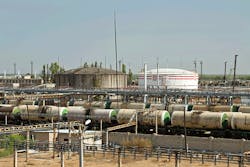OSHA: Railcar Was Unsafe for Entry before Deadly Blast
Moments before a blast ripped through a railcar on April 14, a check of the air quality inside indicated a serious risk of an explosion. Despite the warning, Nebraska Railcar Cleaning Services sent two employees, aged 41 and 45, into the railcar to work without monitoring the air continuously for explosive hazards as required. The employees also were not given emergency retrieval equipment or properly fitted respirators.
The resulting explosion blew the railcar’s escape ladder off and killed the two men, trapping one inside and hurling the other off the top of the railcar. A third employee was injured.
“Our hearts go out to the families of these workers, whose deaths were so senseless and preventable,” said Dr. David Michaels, assistant secretary of labor for occupational safety and health. “This isn’t the first time this employer put its workers’ lives at risk – but OSHA will do everything in our power to ensure it is the last.”
After its investigation at the company’s Hickory Street, Pierce Street and South 30th Street sites following the explosion, OSHA cited Nebraska Railcar Cleaning Services for seven egregious willful, three willful, two repeated, 20 serious and one other-than-serious safety and health violations on Oct. 13. The company faces penalties of $963,000. OSHA also placed the company in the Severe Violator Enforcement Program.
The egregious willful violations involve multiple instances of failing to monitor air quality properly in confined spaces as required and for not fit-testing employees required to use respirators in railcars. Most railcars are confined spaces, which are large enough for workers to enter and perform certain jobs, such as cleaning and maintenance, but are not designed for continuous occupancy. Safety regulations require that employers evaluate confined spaces for air quality and other hazards prior to allowing workers to enter and then monitor conditions while employees are inside.
“This company has regularly failed to use appropriate equipment and procedures to keep their employees safe̶, and in this case it had tragic consequences,” said Jeff Funke, OSHA’s area director in Omaha. “The company needs to immediately reevaluate its procedures for entering and cleaning railcars.”
In the most recent citations, OSHA investigators claimed Nebraska Rail Car Services also failed to:
- Train workers on hazard materials in use.
- Establish a hazardous waste program to include training, proper handling and removal.
- Label containers for chemical hazards.
- Guard floor openings to prevent fall hazards.
- Establish a hearing conservation program.
- Provide first aid and fire extinguisher training.
- Remove damaged powered industrial vehicles.
- Correct numerous electrical safety violations.
- Train workers on safely operating powered industrial vehicles, a violation the company was cited for in 2013.
- The U.S. Environmental Protection Agency currently is investigating allegations that the company improperly disposed of hazardous waste.
Previous OSHA Inspections Turned Up Violations
Nebraska Railcar Cleaning Services and Omaha Transloading LLC, which share a majority owner, Steven Braithwaite, have had several previous OSHA inspections. In 2013, Nebraska Railcar Cleaning was cited for hearing conservation, respiratory protection, permit-required confined space and powered industrial truck hazards. In 2012, Omaha Transloading was issued serious citations for respiratory protection deficiencies and electrical hazards. OSHA cited another company owned by Braithwaite, Demolition Contractors Inc., in 2005 for similar hazards including a willful violation for inadequate respiratory protection.
Nebraska Railcar has had five whistleblower complaints filed with OSHA since 2013. Two are under investigation.
The company specializes in cleaning railcars that contained food grade products, herbicides, pesticides, fertilizers, used oil, asphalt, gasoline and ethanol. At the time of the 2015 inspection, it employed 35 workers at three locations in Omaha. Its workers’ compensation provider is Travelers Indemnity Co. of Overland Park, Kansas.
The company has 15 business days from receipt of its citations and penalties to comply, request an informal conference with Funke or contest the findings before the independent Occupational Safety and Health Review Commission.
About the Author

Sandy Smith
Sandy Smith is the former content director of EHS Today, and is currently the EHSQ content & community lead at Intelex Technologies Inc. She has written about occupational safety and health and environmental issues since 1990.
